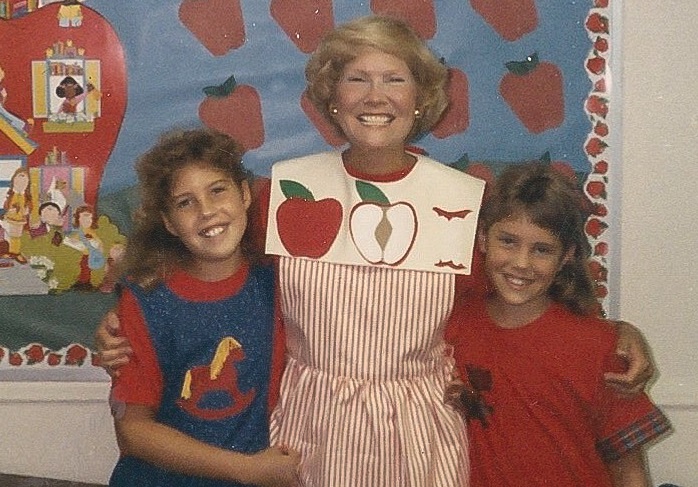She tried diet and exercise. But her high cholesterol came from her genes.
By Nancy Brown, American Heart Association CEO

As Anna Rambo and her husband moved around the country – setting up homes in four states, having a son in each – she knew there was something to take care of once life settled down.
The time came early last year.
She went to her family doctor for a physical and gave him the quick version of her medical history: Her mom had a stroke caused by high cholesterol, her sister has high cholesterol, and Anna herself was diagnosed with high cholesterol at age 8. Now in her late 30s, she’d never taken medicine, but she’d always followed a healthy diet and remained active.
OK, the doctor said. Let’s take your blood work and see what the tests show.
The result: “You have crazy-high numbers!” the doctor told her.
That’s not all he said. Anna was diagnosed with familial hypercholesterolemia(link opens in new window), a term she’d never heard and one you probably haven’t, either. But if you or a loved one have a family history of high cholesterol(link opens in new window), it’s something you should know – especially if you have children.

Spoiler alert for the rest of Anna’s story: Two of her boys have FH; her baby is too young to be tested.
“When I was growing up, they just told me to watch my diet and exercise,” she said. “But now, for my kids’ generation, there is hope. We know there is treatment available.”
FH is a condition marked by high levels of LDL cholesterol, the “bad” one(link opens in new window). While everyone’s cholesterol levels tend to rise with age, LDL levels for FH patients start high from birth.
High cholesterol is fearsome because it can lead to a buildup of plaque in arteries. Like gunk in a pipe, too much can cause a blockage. In a body, those kinds of blockages can lead to a heart attack or stroke. Other serious issues are in play, too.
Left untreated, one in two men with FH will have a heart attack before they turn 50; 30 percent of untreated women will have a heart attack by their 60th birthday. One in every 250 people have FH – and more than 90 percent of Americans don’t know it.
Treatment(link opens in new window) indeed starts with diet and exercise; not smoking helps, too. Doctors also may prescribe cholesterol-lowering medicines known as statins(link opens in new window).
What’s considered FH-caliber high LDL? Above 190.
Anna was in the 300s when her doctor called on St. Patrick’s Day in 2017. She’s now under 120 and trying to dip below 100.
Cholesterol barged into Anna’s life during her childhood in Baytown, Texas. Her mom’s high cholesterol was serious enough that Anna and her two older sisters were taken a half-hour west to Houston for testing at a top-notch medical center.
Sure enough, Anna and one of her sisters had “ridiculously high numbers for that age.” Yet back then, in the late 1980s, the advice was, essentially, “Keep an eye on it.”
“We just kind of lived life like everything was normal,” Anna said. “I had the mindset of, `I’ll deal with it later.’”
A decade later, her mom, a teacher, was in her third-grade classroom when she didn’t feel right. The school nurse recommended she go to the hospital. She was having a stroke.
She suffered no long-term consequences, but doctors have monitored her cholesterol more aggressively. It’s worked, too, as she’s had no more cardiovascular scares. Aided further by a new class of medicines known as PCSK9 inhibitors, Anna’s mom’s LDL numbers are in the 80s. (Ditto for Anna’s sister, who also takes statins.)
When her mom suffered the stroke, Anna was in college. She rushed to the hospital and spent several days alongside her mom. Hearing that high cholesterol was the culprit caused Anna to … well, actually, not do anything.
“I really thought, 'That can’t happen to me,’” she said. “I’m going to take control, running and eating right. And I did. I ran marathons and half-marathons. I was a vegetarian for a while.”
At 22, she married Philip, a budding neuropsychologist. Their first son, Neil, arrived while in graduate school in Oklahoma. Caleb was born in Connecticut, Miles in Montana and Owen in Kansas.
Along the way, Anna saw plenty of OB-GYNs, but none checked her cholesterol. Not that it mattered; women who are pregnant or trying to get pregnant are advised against taking statins. Anna knew this, which is part of the reason she delayed getting tested.
When she finally made that fateful visit to her family doctor last year, Anna hoped that diet and exercise had kept her numbers in check. Still, she braced for harsh results.
Getting those harsh results was one thing. Learning that she had FH could’ve made it worse. But Anna found it freeing.
“It was comforting to know there was a name for it, that it was something I could research,” she said. “Everything kind of clicked once I got that diagnosis.”
She soon discovered the FH Foundation(link opens in new window). Three months later, she attended an event in Washington, D.C. That’s when she learned her kids had a 50-50 chance of having FH. And that – unlike when she was young – treatment could begin at age 10.

After so many years of being in the dark about her own case, Anna felt there was no time to waste with her children. So she and Philip had the cholesterol levels checked for Neil, Caleb and Miles.
Genetic testing is available for FH, and is becoming more common, but today most people are diagnosed based on their LDL cholesterol and family history.
Neil, who is 9, and Miles, who is 4, have FH. Caleb, who is 7, doesn’t. Owen will have his cholesterol tested after he turns 2 next month.
Neil and Miles see a pediatric endocrinologist twice a year, plus a dietitian. Both are likely to take medication once they’re old enough, with Neil only months from being eligible.
Anna remains involved with the FH Foundation and has become active in my organization, the American Heart Association. She wants others to learn about the condition and to feel as empowered as she is. This is a great time, as FH Awareness Day is Sept. 24.
Anna’s passion comes from a deep place. After all, FH runs in families, and she not only has FH, she’s also the daughter, sister and mother of people with FH.
“You may know that heart disease runs in your family and that you have high cholesterol, but maybe you haven’t put it together,” she said. “This is a genetic condition that needs treatment. Diagnosis is going to save lives. And it’s as simple as a blood test and knowing your family history.”
A version of this column also appeared on Thrive Global(link opens in new window).
If you have questions or comments about this story, please email [email protected].





